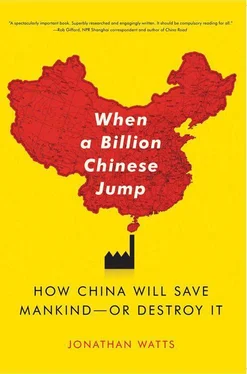I was thrilled. The junk was a journalistic treasure. I could recycle it for a story proving that the ban on waste imports had been evaded yet again, and that the cleanup of the recycling industry was merely a cosmetic exercise that pushed the problem from the suburbs into the countryside. It had taken a long time and a lot of luck to find. Earlier in the day, we visited Nanhai, but the former recycling hub was eerily deserted. The streets were swept clean and the small sheds shuttered up. The only sign of what the area had been was a foul stream and a handful of dispirited locals for whom the UK media’s reports and the government’s sudden concern about the environment were a financial disaster.
“It’s a terrible blow because we only started this business last year. We get no compensation. All we can do is wait and hope the government allows us to restart business,” said one old man, Ding Chunming, who used to process plastic bottles and bags. Others were less patient and optimistic. There were rumors that less law-abiding recyclers had moved to a new location. My assistant, my photographer, and I got nowhere in asking the authorities where that might be. We wasted so many hours searching that I considered giving up and going home.
But by then our taxi driver had entered so completely into the spirit of the hunt that he took the initiative. In the next town he stopped at the first car-scrap dealer on the roadside and, without any prompting, made up a completely fictitious story about us being foreign businessmen looking for a place to sell overseas rubbish. Within minutes, he had directions for Shijing. I sat in the car, a passive conspirator in the deception but its main beneficiary.
For most of the two-hour drive to Shijing we argued over the journalistic ethics of this pretense. “You’ll never get any real news in Guangdong if you come clean that you are a journalist,” the cameraman—a veteran in the region—told me. I initially claimed the moral high ground, asserting that journalists should speak as well as write the truth. But I realized my words were hypocritical. I was benefiting from the falsehood, so I should either abandon the project or take part in the deception. I chose the latter, justifying this to myself as a small wrong to expose a bigger one.
Minutes later I was lying myself, posing on the phone as a British plastic-waste dealer and hearing from a potential business partner in Guangdong that we could evade the ban on foreign rubbish by bringing it in through Hong Kong. He offered me $100 a ton. 39By the time we reached Shijing, I had jettisoned my qualms and entered fully into my new fake role.
Most of the rubbish recyclers were unconvinced by my act and treated me with understandable suspicion. There was no hostility but considerable concern about the presence of a foreigner in a place that no overseas businessman was likely to visit. The people we met were at the bottom of the social ladder. They had been moved on once because media coverage about “dirty China” embarrassed their government. Seeing us, they feared the same thing would happen again. A local businesswoman, who gave her name only as Ms. Liang, guessed immediately that I was a journalist and begged me not to write a critical story. “We have only just got here from Nanhai,” she told me. “I have never dealt with foreign waste. I can’t do it now and I won’t do it in the future.”
But another, more credulous, man told me he was willing to strike a deal if the price was right. He did not realize he might be incriminating himself to a journalist. My ability to deceive had improved.
I left with a miniscoop and a major feeling of guilt. 40The Guangdong recyclers were clearing up the world’s mess, yet they were treated as if they created it. Pushed ever farther out of sight along with the rubbish, they helped to maintain the illusion of environmental improvement in developed Western nations and rich cities like Beijing, Guangzhou, and Shanghai. In reality, there was no cleanup, just a widening of the distance between consumption and its consequences. This was the opposite of responsible self-governance, but Guangdong—despite its lawless history—was not primarily to blame. Sniffing around the province’s waste dumps, I had found a stinking pile of hypocrisy. The stench followed me all the way home.
6. Gross Domestic Pollution
Jiangsu and Zhejiang
Local governments have more revenues, the per capita income is a lot higher and many farmers have turned themselves into workers or even entrepreneurs, but what was once paradise on Earth has been degraded into dumping grounds of industrial waste.
—Yang Jike, Chinese People’s Political Consultative Conference Standing Committee 1
The road to riches is paved with empire-building ambitions in early twenty-first-century China. Dirt tracks widen to eight-lane superhighways. Isolated villages swell into globalized cities. And Gross Domestic Product—that triumph of human quantity over natural quality—expands outward in a widening ripple of concrete, steel, and smoke. The heretics of the age warn that expansion is hitting an environmental limit. The idols find new ways to break industrial ground. In Jiangsu, the wealthiest province in China, 2I traced the environmental tracks of some of those economic pioneers.
My journey began, unexpectedly, in a stretch limousine that had been sent from Huaxi Village to pick me up. It was an incongruous sight among the taxis lined up outside the airport, and I wondered briefly if I was being secretly filmed for a send-up video as the driver opened the door into the spacious leather-upholstered interior.
I could not help grinning. My host, an official with the Huaxi propaganda department, frowned. Not wanting to offend, I tried to explain.
“I’m sorry, I’ve never been in a car like this before and I didn’t expect one here. In my mind, stretch limos are for Hollywood idols and business tycoons. Yet here we are on the way to a model communist village. This is lavish hospitality. Thank you!”
Deputy Secretary Sun Haiyan smiled politely. He then addressed my misconceptions: It should not come as a surprise, he said, to find a limousine in Jiangsu Province. China was no longer poor and we were not going to just any model community; we were on the way to Huaxi, the “Number One Village” in the wealthiest province of the fastest-growing nation of the early twenty-first century.
We drove for forty minutes in embarrassing comfort through the flood-plains. Then suddenly, in the distance, nine massive gold-roofed pagodas rose up out of the rural landscape. Fields gave way to an industrial estate. We passed through streets of shops and then row after row of symmetrical, large but rather tatty pale-blue houses.
We stopped in front of the largest of the pagodas, a hotel. I was checked into the presidential suite, easily the biggest room in which I have ever slept. We were then treated to a lavish lunch of globefish, tapertail anchovies, and more than a dozen other delicacies. In case I had missed the significance of the limousine, this was my chance to be impressed.
Huaxi was proud of its achievements. A pioneer of rural development, it had been at the front line of the semilegal town-and-village enterprise movement in the 1980s that went on to become a driving force of the national economy. By turns surreal, impressive, and alarming, it was an early home to communists with stock options, farmers pushing back the boundaries of industry, and farmers cruising around in luxury sedans.
The eccentric glory of Huaxi encapsulated every quirk and contradiction in modern China, then magnified and distorted them like the image in a fairground mirror. It was a communist Utopia ten years past its sell-by date reinvented as a pioneering capitalist community. It was a Potemkin model village boasting its very own White House and Forbidden City. It was also a model of unsustainability, dependent on relentless expansion to treat its residents to European cars, lakeside mansions, and trips to Hawaii.
Читать дальше










